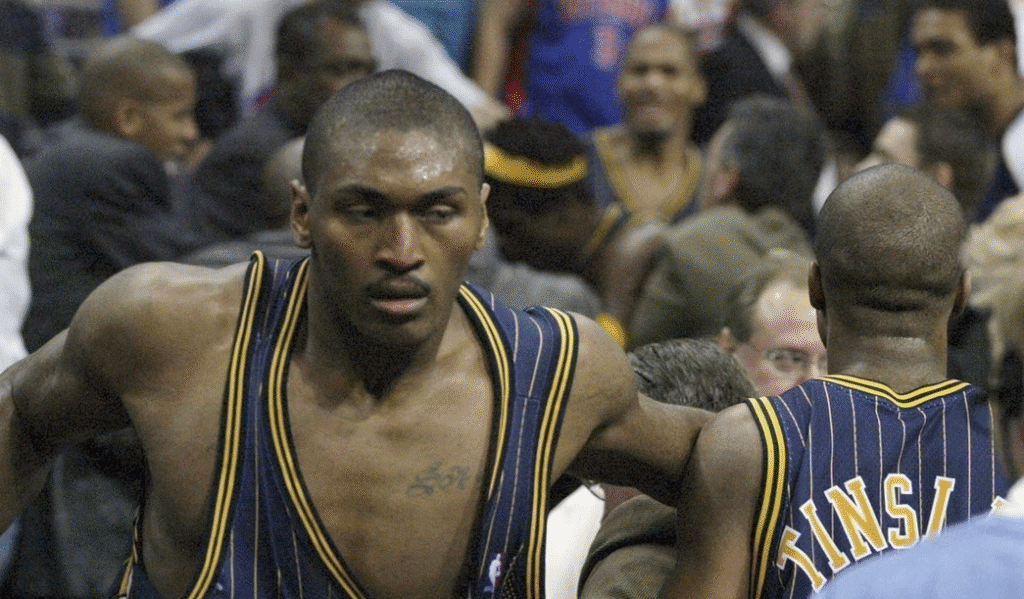From Million-Dollar Losses to Lifetime Bans: The Full Story of the Malice at the Palace, the Brawl That Changed Basketball Forever

On November 19, 2004, the NBA experienced one of its darkest and most unforgettable nights. A regular-season game between the Indiana Pacers and the Detroit Pistons inside The Palace of Auburn Hills turned into an all-out riot. What started as a hard foul spiraled into one of the ugliest scenes in sports history, forever known as The Malice at the Palace.
The Pacers and Pistons already had bad blood. Just months earlier, the Pistons had eliminated Indiana in the Eastern Conference Finals before going on to win the championship. That tension came to a boiling point late in the game when Indiana’s Ron Artest fouled Detroit’s Ben Wallace under the basket. Wallace shoved Artest, sparking a heated confrontation between the teams. The referees and teammates separated the players, and for a brief moment, things seemed to be under control.

Then came the moment that changed everything. As Artest laid on the scorer’s table trying to cool down, a Pistons fan launched a drink cup that hit him squarely. Artest sprang into the stands, charging after the man he thought threw it. Teammate Stephen Jackson followed, swinging at other fans, and the arena erupted into chaos. Fans fought players, players fought fans, and security had no chance of stopping the mayhem.
The images from that night Artest brawling in the stands, Jermaine O’Neal’s sliding punch on a fan who stormed the court, and popcorn and drinks raining down on the Pacers spread like wildfire. Commentators sat in stunned disbelief, calling it one of the darkest moments the NBA had ever seen.

The Fallout: Suspensions and Financial Losses
The aftermath was unprecedented. NBA Commissioner David Stern handed down the harshest suspensions in league history. Ron Artest was suspended for the rest of the 2004–05 season, totaling 86 games, costing him nearly $5 million in salary. Stephen Jackson was suspended for 30 games, losing about $1.7 million. Jermaine O’Neal was given 25 games (later reduced to 15 on appeal), costing him nearly $4 million. In total, players lost more than $11 million in salary.
In addition to the headline suspensions, Ben Wallace received a six-game ban, Anthony Johnson got five games, and Reggie Miller though retired just a year later was fined for leaving the bench during the brawl. For the Pacers, who had been legitimate championship contenders, the suspensions derailed their season and their future as a team.
VIDEO:
Consequences for Fans
The fans involved in the melee didn’t walk away unscathed either. Several were arrested and faced criminal charges, ranging from assault to disorderly conduct. The man who threw the cup that hit Artest, John Green, was identified and banned from attending Pistons games for life. Other fans who rushed the court or threw objects were also permanently banned.
Videos from that night became evidence in court, with prosecutors using them to hand out punishments. It was clear that while the players bore the brunt of the criticism, the fans who instigated and escalated the violence were also held accountable.

Long-Term Changes to the NBA
The Malice at the Palace forced the NBA to make sweeping changes. Security at arenas was drastically increased, with more personnel added specifically to monitor fan behavior. The league also tightened restrictions on alcohol sales, limiting how much fans could buy during games. Fans now had to understand: storming the court or throwing objects at players would result in ejection and possible lifetime bans.
The NBA also reevaluated its image. The league was harshly criticized in the media, with some outlets painting its players as “thugs.” The incident fueled stereotypes and hurt the NBA’s public reputation, particularly among more casual fans. David Stern made it clear he wanted to rebuild the league’s image by emphasizing professionalism, respect, and stricter rules of conduct.

A Legacy of Chaos
For the Pacers, the fight was devastating. The team never recovered its momentum. What could have been a championship season for a talented roster instead turned into years of rebuilding. For the Pistons, the brawl tarnished the reputation of a championship franchise, with many fans embarrassed by what had happened in their home arena.
Nearly two decades later, the Malice at the Palace remains infamous. Documentaries and interviews continue to revisit that night. Players like Artest, Stephen Jackson, and Jermaine O’Neal have since spoken out, defending their actions as self-defense against hostile fans while also acknowledging the chaos that ensued.
The Palace of Auburn Hills has since been demolished, but the memory of that night will never fade. The Malice at the Palace wasn’t just a fight it was a turning point. It cost players millions, led to lifetime bans for fans, changed NBA security forever, and left a permanent scar on the league’s history.